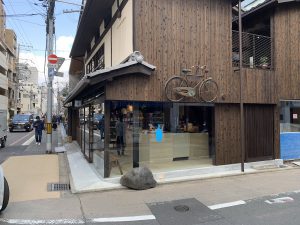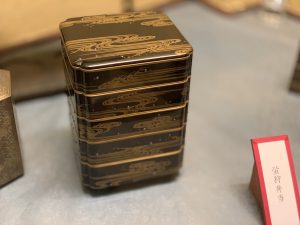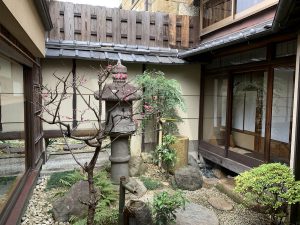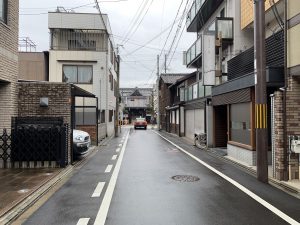Do Kyoto people really speak? -About the character of Kyoto people-
I moved from Tokyo to Kyoto.
Finally in Kyoto! Not really, but I decided to do so anyway. Since it's a big deal, I decided to write down the good points, points to note, and points of concern about moving to Kyoto. I want to live in Kyoto someday! Or, I hope it will be of some help to those who are thinking about moving to Kyoto in earnest.
 First of all, when I say that I moved to Kyoto, I was asked "Does the Kyoto people really speak their true intentions?", "Is the Kyoto people cold?", "The Bubu-zuke culture really is. Is there any? " By the way, the culture of Bubu-zuke means that when you are visiting a Kyoto person's house and asked, "Do you want to eat Bubu-zuke (Ochazuke)?" Famous episode. And such a Kyoto-like personality is called "Ikezu".
First of all, when I say that I moved to Kyoto, I was asked "Does the Kyoto people really speak their true intentions?", "Is the Kyoto people cold?", "The Bubu-zuke culture really is. Is there any? " By the way, the culture of Bubu-zuke means that when you are visiting a Kyoto person's house and asked, "Do you want to eat Bubu-zuke (Ochazuke)?" Famous episode. And such a Kyoto-like personality is called "Ikezu".So how is it actually?
From the conclusion, "There are certainly people like that" (laughs).
 The story of a friend who also moved from Tokyo to Kyoto.
A friend born in Tokyo and two seniors from the company (both are Kyoto people) were having lunch at a set meal restaurant in Kyoto. 80% of the seats are occupied in the store, but it is not full. The three people who finished eating lunch had a chat after the meal. The clerk offered a substitute for tea and said, "Please take your time." Then, two seniors from Kyoto said, "Then, let's get out soon." A friend said, "Yes? The seats aren't full, and there aren't any customers waiting in front of the store. I'm getting another cup of tea, why !?" That's no surprise. It's a very legitimate reaction for people in Tokyo.
The story of a friend who also moved from Tokyo to Kyoto.
A friend born in Tokyo and two seniors from the company (both are Kyoto people) were having lunch at a set meal restaurant in Kyoto. 80% of the seats are occupied in the store, but it is not full. The three people who finished eating lunch had a chat after the meal. The clerk offered a substitute for tea and said, "Please take your time." Then, two seniors from Kyoto said, "Then, let's get out soon." A friend said, "Yes? The seats aren't full, and there aren't any customers waiting in front of the store. I'm getting another cup of tea, why !?" That's no surprise. It's a very legitimate reaction for people in Tokyo.

But there is Kyoto. The intention of the clerk who served the tea was "Please come out soon", and the two Kyoto people saw it.
When I'm in Kyoto, I hear this story from time to time. How often is it about once a year. In other words, I rarely ask. In fact, I have little experience with that. I wrote most of them because I may have met such an eye, but I may not have noticed it (laughs).
Another one, this time from the Kyoto side.
 A story about a woman born and raised in Kyoto.
When the woman was a college student, she decided to leave Kyoto and go to a university in Fukui. When I asked my friend "Do you want to eat sweets?", He said "Yeah, thank you" and he was a little shocked by the fact that he ate it.
What this means is that in Kyoto, in such cases, we refrain from refusing at first. If you still tell me, he will get sweets.
When I heard this story, this was a culture shock (laughs). At the same time, I thought it would be true. Perhaps everyone in Kyoto has learned modest manners, manners, and ways of thinking as a base in an environment from an early age. Perhaps it's the aesthetic that the old Japanese had. It's rude to say it directly to the other party, or even if you get sweets, it's rude to get them right away. People living in areas other than Kyoto have forgotten quite a bit, and in the present age when it is the mainstream of Japan, I wonder if there are many Kyoto people who still maintain that culture. Impression that I said. & nbsp; However, I only hear such stories from time to time.
A story about a woman born and raised in Kyoto.
When the woman was a college student, she decided to leave Kyoto and go to a university in Fukui. When I asked my friend "Do you want to eat sweets?", He said "Yeah, thank you" and he was a little shocked by the fact that he ate it.
What this means is that in Kyoto, in such cases, we refrain from refusing at first. If you still tell me, he will get sweets.
When I heard this story, this was a culture shock (laughs). At the same time, I thought it would be true. Perhaps everyone in Kyoto has learned modest manners, manners, and ways of thinking as a base in an environment from an early age. Perhaps it's the aesthetic that the old Japanese had. It's rude to say it directly to the other party, or even if you get sweets, it's rude to get them right away. People living in areas other than Kyoto have forgotten quite a bit, and in the present age when it is the mainstream of Japan, I wonder if there are many Kyoto people who still maintain that culture. Impression that I said. & nbsp; However, I only hear such stories from time to time.

As for how often, I asked him who lived in Tokyo, "He used to be a Yankee."
An endangered yankee that is rarely heard in the world today. I think it's an endangered species. Well, on the contrary, there are quite a few Yankees in Kyoto (laughs).
That's why I want to live in Kyoto, but I'm afraid of the exclusive image of Kyoto people, so people don't have to be so afraid. However, such people are not zero. So, I think it's better to listen to such a story in a fun way.

 First of all, when I say that I moved to Kyoto, I was asked "Does the Kyoto people really speak their true intentions?", "Is the Kyoto people cold?", "The Bubu-zuke culture really is. Is there any? " By the way, the culture of Bubu-zuke means that when you are visiting a Kyoto person's house and asked, "Do you want to eat Bubu-zuke (Ochazuke)?" Famous episode. And such a Kyoto-like personality is called "Ikezu".
First of all, when I say that I moved to Kyoto, I was asked "Does the Kyoto people really speak their true intentions?", "Is the Kyoto people cold?", "The Bubu-zuke culture really is. Is there any? " By the way, the culture of Bubu-zuke means that when you are visiting a Kyoto person's house and asked, "Do you want to eat Bubu-zuke (Ochazuke)?" Famous episode. And such a Kyoto-like personality is called "Ikezu". The story of a friend who also moved from Tokyo to Kyoto.
A friend born in Tokyo and two seniors from the company (both are Kyoto people) were having lunch at a set meal restaurant in Kyoto. 80% of the seats are occupied in the store, but it is not full. The three people who finished eating lunch had a chat after the meal. The clerk offered a substitute for tea and said, "Please take your time." Then, two seniors from Kyoto said, "Then, let's get out soon." A friend said, "Yes? The seats aren't full, and there aren't any customers waiting in front of the store. I'm getting another cup of tea, why !?" That's no surprise. It's a very legitimate reaction for people in Tokyo.
The story of a friend who also moved from Tokyo to Kyoto.
A friend born in Tokyo and two seniors from the company (both are Kyoto people) were having lunch at a set meal restaurant in Kyoto. 80% of the seats are occupied in the store, but it is not full. The three people who finished eating lunch had a chat after the meal. The clerk offered a substitute for tea and said, "Please take your time." Then, two seniors from Kyoto said, "Then, let's get out soon." A friend said, "Yes? The seats aren't full, and there aren't any customers waiting in front of the store. I'm getting another cup of tea, why !?" That's no surprise. It's a very legitimate reaction for people in Tokyo.

 A story about a woman born and raised in Kyoto.
When the woman was a college student, she decided to leave Kyoto and go to a university in Fukui. When I asked my friend "Do you want to eat sweets?", He said "Yeah, thank you" and he was a little shocked by the fact that he ate it.
What this means is that in Kyoto, in such cases, we refrain from refusing at first. If you still tell me, he will get sweets.
When I heard this story, this was a culture shock (laughs). At the same time, I thought it would be true. Perhaps everyone in Kyoto has learned modest manners, manners, and ways of thinking as a base in an environment from an early age. Perhaps it's the aesthetic that the old Japanese had. It's rude to say it directly to the other party, or even if you get sweets, it's rude to get them right away. People living in areas other than Kyoto have forgotten quite a bit, and in the present age when it is the mainstream of Japan, I wonder if there are many Kyoto people who still maintain that culture. Impression that I said. & nbsp; However, I only hear such stories from time to time.
A story about a woman born and raised in Kyoto.
When the woman was a college student, she decided to leave Kyoto and go to a university in Fukui. When I asked my friend "Do you want to eat sweets?", He said "Yeah, thank you" and he was a little shocked by the fact that he ate it.
What this means is that in Kyoto, in such cases, we refrain from refusing at first. If you still tell me, he will get sweets.
When I heard this story, this was a culture shock (laughs). At the same time, I thought it would be true. Perhaps everyone in Kyoto has learned modest manners, manners, and ways of thinking as a base in an environment from an early age. Perhaps it's the aesthetic that the old Japanese had. It's rude to say it directly to the other party, or even if you get sweets, it's rude to get them right away. People living in areas other than Kyoto have forgotten quite a bit, and in the present age when it is the mainstream of Japan, I wonder if there are many Kyoto people who still maintain that culture. Impression that I said. & nbsp; However, I only hear such stories from time to time.





